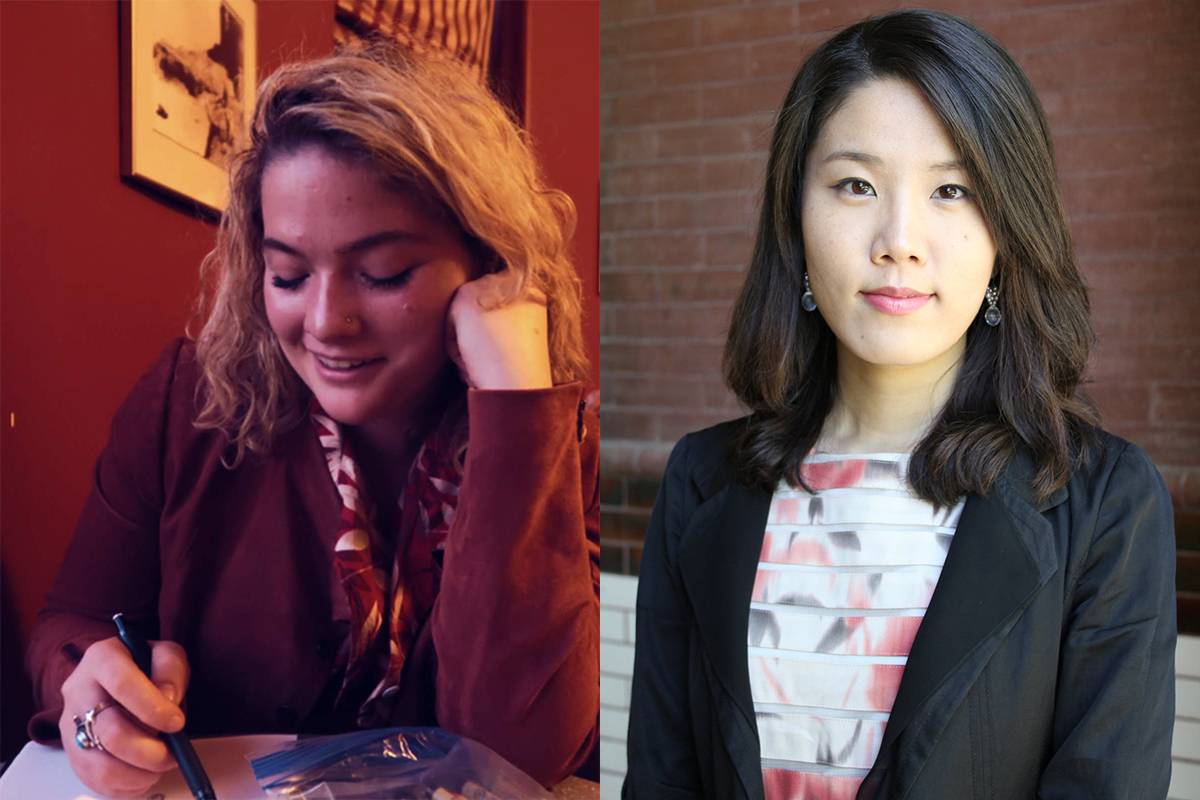Communication Major Emma Whitehouse Contributes Research to Prestigious Conference
By Gina Myers
 Communication major Emma Whitehouse (left) worked with Associate Professor of Communication Hyunmin Lee, PhD, on the paper "What do you mean by doing the right thing?: Examining corporate social advocacy frames in Fortune 500 companies’ websites."
Communication major Emma Whitehouse (left) worked with Associate Professor of Communication Hyunmin Lee, PhD, on the paper "What do you mean by doing the right thing?: Examining corporate social advocacy frames in Fortune 500 companies’ websites."
September 21, 2021
Though co-op opportunities initially drew Emma Whitehouse to Drexel, her college experience has also been enrichened through the opportunity to do research as an undergraduate student. With mentor Hyunmin Lee, PhD, associate professor of communication, Whitehouse recently had a paper accepted for the Association of Education in Journalism and Mass Communication (AEJMC)’s 104th annual conference, which took place last month.
“It was a fairly large project that took a long time,” Whitehouse explains. “When it was accepted by AEJMC, I was a bit overwhelmed, but I was also just really thrilled and really grateful to have a mentor like Professor Lee because she was so communicative and supportive throughout the process.”
Titled “What do you mean by doing the right thing?: Examining corporate social advocacy frames in Fortune 500 companies’ websites,” the paper investigates the growing popularity of corporate social advocacy (CSA) and how companies communicate their CSAs, whether through thematic framing (the presentation of issues through information about their systemic causes, trends and consequences) or episodic framing (the presentation of issues through a single person or event); where on their websites companies choose to share this information; and what causes were more common to advocate for across the companies’ websites.
“The public demands corporations be more vocal and at the forefront in terms of calling for changes at both the political and societal level, so the expectations for corporations are higher than ever,” Lee explains. “Corporations recognize that they have to do more for society than simply providing goods and services, creating jobs and paying taxes. They understand they can contribute to the betterment of society through civic engagement issues like donating to nonprofit organizations and forming partnerships, but social advocacy takes that to another level because it is taking stance on a political issue that could potentially alienate some customers.”
The paper examines what social justice from a corporation looks like: What stances are the corporations taking? How are they communicating those stances? Is the information easily accessible? Does it seem like a PR move or are the corporations also taking actionable items?
Whitehouse and Lee coded and analyzed the websites of all Fortune 500 companies. They found corporations were more likely to convey CSA messages through individual stories (episodic framing) that were largely placed on an employee section of the website. The most popular CSA issues were based around disability and gender equality, and the most common action item the companies took for combating disparities were offering professional networking opportunities to help support employees for career advancement.
For Whitehouse, it was surprising to see the different levels of effort companies put into their CSA. “I think conversations around the role of CSA have really been changing and gaining in popularity,” she says. “I think it will be interesting to see how those efforts change over time because it’s definitely attractive for some employees to want to work for a company that reflects their own values.”
This was the second project that Whitehouse worked on as a research assistant with Lee. The two initially met when Whitehouse was a student of Lee’s during her freshman year. “I noticed Emma had an eye for critical analysis. She would offer in-depth analysis, and she was well read and a good writer. I told her that I thought she would be a great researcher,” says Lee.
The word of encouragement may have stuck with Whitehouse, as she later reached out to Lee to see if there were any research opportunities available. Through her marketing and public relations co-op at Health Union, Whitehouse had been exposed to what working in industry would be like, but she also wanted to explore more of the academic side of communication and the social sciences. She is grateful for getting to work with Lee and all that the experience has taught her.
“Research challenges traditional thought processes because you really need to focus on facts versus opinion. These analytical skills are useful for all aspects of people’s lives,” she says. “Research also teaches patience because it takes time to for projects to get wrapped up. I think it develops valuable skills that can help people in various career paths.”
And the experience will certainly help Whitehouse on her own path. Following graduation next spring, she hopes to pursue a career in industry that focuses on health care and technology for a few years before returning to school for an advanced degree.
“It was such a joyous experience to work with Emma,” says Lee. “I’m really happy that I got to share the full experience with her—to show her how a research idea develops, how it’s executed and how it’s wrapped up in the final stages as well. She got to see the whole process.”
“I think working with an undergraduate researcher like Emma speaks volumes to the type of students that Drexel attracts and the ways in which Drexel nurtures students along their way as well. Our students are very engaged, they’re intelligent, and they’re hardworking. These are the qualities I value for a researcher.”